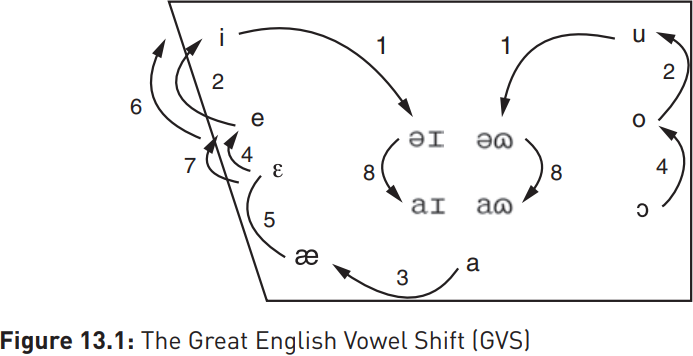


 Grammar
Grammar
 Tenses
Tenses
 Present
Present
 Past
Past
 Future
Future
 Parts Of Speech
Parts Of Speech
 Nouns
Nouns
 Verbs
Verbs
 Adverbs
Adverbs
 Adjectives
Adjectives
 Pronouns
Pronouns
 Pre Position
Pre Position
 Preposition by function
Preposition by function 
 Preposition by construction
Preposition by construction
 Conjunctions
Conjunctions
 Interjections
Interjections
 Grammar Rules
Grammar Rules
 Linguistics
Linguistics
 Semantics
Semantics
 Pragmatics
Pragmatics
 Reading Comprehension
Reading Comprehension|
Read More
Date: 2023-11-16
Date: 2023-11-03
Date: 2023-09-02
|
Chain shifts
Chain shifts, which affect vowels, are a different kind of systemic change, which restore balance rather than promote economy. The best known example is the Great Vowel Shift (GVS) of English, which affected all the long vowels between the fifteenth and seventeenth centuries:

The chain shift appears to have been triggered by a change in realization of the /i:/ vowel in words like bite and side, which would once have been pronounced  , but diphthongized to
, but diphthongized to  , and later [aI]; similar developments affected the back vowel /u:/ in, for example, house
, and later [aI]; similar developments affected the back vowel /u:/ in, for example, house  , and mouse
, and mouse  , which diphthongized to
, which diphthongized to  (and later
(and later  ) This left a space in the area formerly occupied by /u:/ and /i:/, into which the vowels immediately below them, i.e. half-close /e:/ and /o:/ of beet and boot respectively, could move. This is called a drag chain effect, in that a movement in one position frees up space into which other vowels may move, but the converse push chain effects appear also to have been involved in GVS. The open front vowel /a:/ of mate (
) This left a space in the area formerly occupied by /u:/ and /i:/, into which the vowels immediately below them, i.e. half-close /e:/ and /o:/ of beet and boot respectively, could move. This is called a drag chain effect, in that a movement in one position frees up space into which other vowels may move, but the converse push chain effects appear also to have been involved in GVS. The open front vowel /a:/ of mate ( ) shifted initially to [æ:] and then to [ε:], forcing the vowel in the existing /ε:/ set (e.g. beat) to move up into the /e:/ position.
) shifted initially to [æ:] and then to [ε:], forcing the vowel in the existing /ε:/ set (e.g. beat) to move up into the /e:/ position.
Similar developments affected long back vowels. The overall effect of these changes from a systemic point of view has been to maximize available space for vowel oppositions in the vocal tract, without changing the overall number of oppositions available. A consequence is the rather chaotic mismatch between sound and grapheme which we witness in English spelling. The letter i now represents /ai/ rather than /i:/ (except in words like ski, borrowed in this case from Norwegian, where the shift did not take place); ee represents /i:/ rather than /e:/ in tree, free etc.; oo represents /u:/ rather than /o:/ in words such as loop, and cool and so on.
|
|
|
|
لخفض ضغط الدم.. دراسة تحدد "تمارين مهمة"
|
|
|
|
|
|
|
طال انتظارها.. ميزة جديدة من "واتساب" تعزز الخصوصية
|
|
|
|
|
|
|
مشاتل الكفيل تزيّن مجمّع أبي الفضل العبّاس (عليه السلام) بالورد استعدادًا لحفل التخرج المركزي
|
|
|